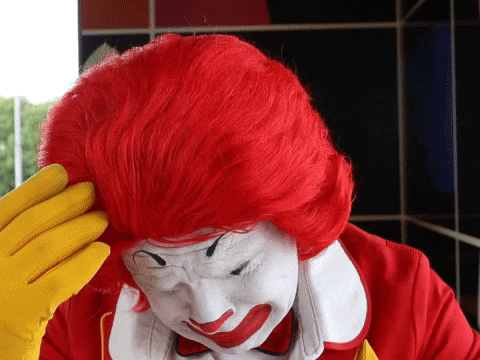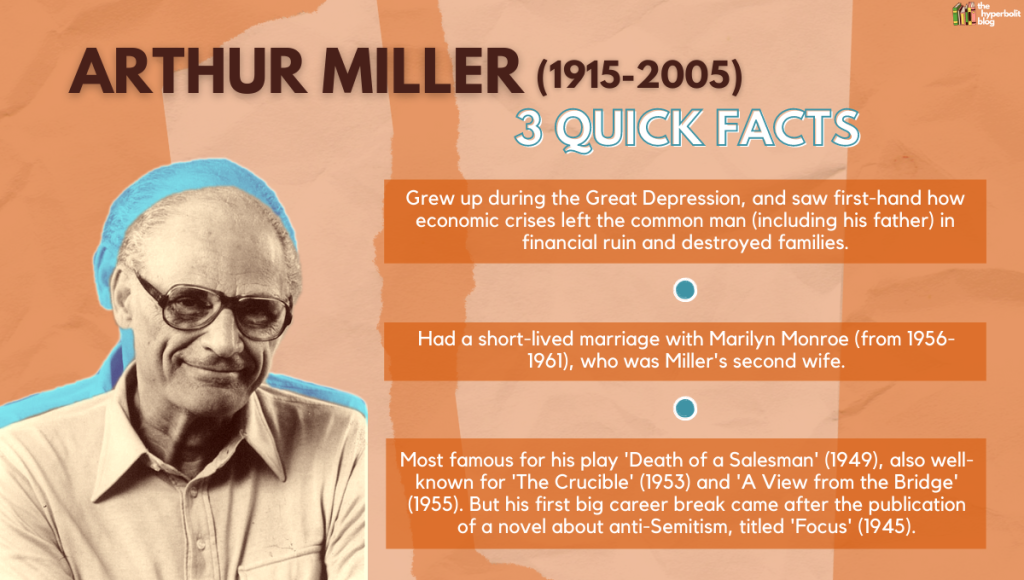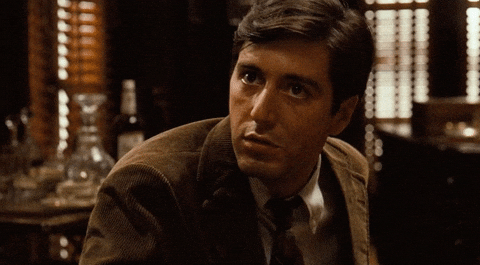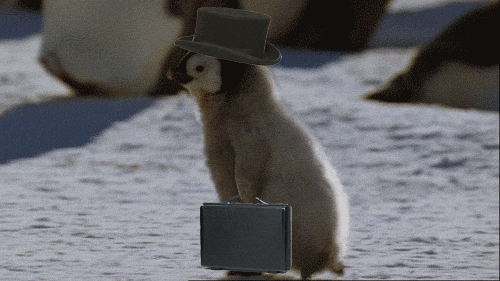You know that something’s great literature when it leaves you with a gut-wrenching feeling.
In my post on irony, I point out that the start of Arthur Miller’s A View from the Bridge (1955) presents a classic example of dramatic irony: it is implied at the beginning of the play that the protagonist will die a bloody death at the end, just as we see him appearing for the first time.
And so even before we’ve warmed up our seats (whether at the playhouse or in the library), we’re already left with a gut punch by this half-spoiler, half-carrot stick bait device. We’re in for a tragic tale, so expect emotional heaviness while reading or watching this play.

It’s serious art that calls for reflection, not mind-numbing popcorn-munching sensory porn. So don’t say you’ve not been warned.
Fair enough. And Miller’s genius has always been his ability to get us to stick around despite this sort of grim warning. In his much loved, widely celebrated and oft-studied play Death a Salesman (1949), we see from the very start of the play that Willy Loman, the 63-year-old traveling salesman with a dogged but misguided faith in the ‘American Dream’, is clearly the stuff of tragedy – with an identity that’s overshadowed by his hamartia (tragic flaw), and the hubris to not see that he does, in fact, have a hamartia which will eventually be his undoing.

Introducing Willy Loman, the “big shot” that never was
In Willy Loman’s head, he is a “big shot” whom everyone knows and likes (he’s not); he’s a top salesman who can just ring up anyone in New England for a deal (he can’t); he is a successful father whose sons are on their way to “greatness” (they aren’t).
The reality, however, is quite the contrary: he’s an average Joe who lives paycheck to paycheck, who struggles to cover even his monthly insurance, who’s bitter about and blind to his sons’ similar mediocrity. He’s just a painfully average man with pedestrian concerns, but he can’t accept that this is real identity and somehow believes that he’s ‘somebody’, or that the name “Willy Loman” carries any prestige and success.

But for all his deluded narcissism, Willy’s hubris isn’t characterised by an off-putting arrogance; it is strangely human, and as such he is humanly endearing – faults and all. When we first see him, he is “carrying two large sample cases”, almost out of breath and exhausted from a long business trip.
The stage description also tells us that, “feeling the soreness of his palms[,] a word-sigh escapes [Willy’s] lips – it might be ‘Oh, boy, oh, boy.” This is the raw, real presentation of a vulnerable man who’s struggling to survive.
By casting Willy Loman in this light, Miller is communicating a clear message: whatever flaws and quirks you will go on to see from this man, he is someone to be sympathised before he is to be judged.
Is Willy Loman a ‘tragic hero’, or is he just plain ‘tragic’?
An interesting question to consider when reading or watching Death of a Salesman (or any modern tragedy, for that matter) is whether Willy Loman qualifies as a ‘tragic hero’. According to Aristotle in Poetics, a ‘tragic hero’ is defined as –
A “highly renowned and prosperous” figure whose “change of fortune presented must not be the spectacle of a virtuous man brought from prosperity to adversity: For this moves neither pity nor fear; it merely shocks us. Nor again, that of a bad man passing from adversity to prosperity: For nothing can be more alien to the spirit of tragedy; . . . it neither satisfied the moral sense nor calls forth pity or fear. Nor, again, should the downfall of the utter villain be exhibited. A plot of this kind would, doubtless, satisfy the moral sense, but it would inspire neither pity nor fear; for pity is aroused by unmerited misfortune, fear by the misfortune of a man like ourselves . . . There remains, then, the character between these two extremes—that of a man who is not eminently good and just, yet whose misfortune is brought about not by vice or depravity, but by some error or frailty”
Clearly, Willy is no modern-day American royalty.
Ironically, he spends his entire life pining after ‘high renown and prosperity’, so he’s not even in a position to fall from that sort of height.
But while the ‘cliff’ that Willy falls from isn’t a socio-economic one, it is a psychological one – between holding onto a lifelong ideal and being forced to accept a reality that is radically different. Willy’s ‘fall’, then, is arguably all the more devastating than the classic Aristotelian version.

But does Miller’s tragic construct fulfil the other Aristotelian criterion – that of inspiring “pity and fear”? There’s more than enough pathos to go around when it comes to the characterisation of an awkward, blustering old man desperately clawing at the edges of sanity and survival, so in terms of pity it’s hard to imagine anyone not feeling sorry for Willy to some extent.
Equally, Willy’s investment of three decades to his company only to then be brutally laid off should evoke a sense of fear in any modern day office worker – the sense that we are all too dispensable, notwithstanding our loyalty or value to a company, because “business is business”, to use the words of Howard, Willy’s unsympathetic but pragmatic boss.

We’ll all Willy, willy-nilly
We pity Willy’s fate, but even more so, we fear that Willy’s fate could one day be our own.
We fear that like Willy the salesman, we could end up working an average job with nothing to show for at the end of our life; we fear that like Willy the father, we could end up with children who fall short of our standards and hate us as a result; we fear that like Willy the husband, we could give in to a moment’s temptation and cheat on our spouses out of loneliness.
Long story short, we fear that we are too much like Willy Loman. (Interestingly, his surname “Lo-man” reminds us of a ‘low man’, a man who is inferior and lowly in the eyes of capitalist society).
The salesman’s tragic stature stems not from the likes of Othello’s outsized jealousy or Macbeth’s overreaching ambition, but from the utterly mundane, which makes his tragedy much more relatable (and for some, much more tragic) to the average theatregoer. He is simply all too human, and he reminds us all too much of ourselves. Essentially, we’ll never be Othello or Macbeth, so our pity or fear towards them will always be felt at a distance.

But pretty much all of us have a potential Willy Loman lurking within, so in this sense, Willy is the ‘tragic hero’ of the common man and woman.
To further explore what makes Willy so tragic, let’s look at 2 key reasons. Specifically, they are:
1) Willy lacks self-awareness – “Call out the name Willy Loman and see what happens!”
2) Willy is ‘alone’ in his world – “I was lonely… I was terribly lonely.”
Reason 1: Willy lacks self-awareness

At the end of the play, Biff, Willy’s second son, delivers a sobering epitaph that sums up his dad in a melancholic, but honest, way:
BIFF: He never knew who he was.
Throughout his life, Willy has lived under the delusion of him being a successful man, or at least a man who’s bound for success yet to be realised. His biggest point of pride is in his alleged ‘likeability’; he believes that he has ‘friends’ all over the place in New England when these are but one-time clients, and he is the sort who thinks that connection-by-association (albeit superficial or fleeting) is the key to success. Instead of humility and maturity, he embraces vanity metrics like popularity, fame and appearance – none of which he possesses.
One of the saddest things about Willy is that he is a maker by nature (someone who’s good with his hands and would have done well making things, like being a carpenter or a builder. We know this from Linda at his funeral, when she laments that “he was so wonderful with his hands”). But he disdains laborious work, and instead buys into the poster capitalist career of becoming a salesman – except he’s just not good at that trade. He’s too much bluster and bombast, and not enough suaveness and tact.

But the more someone talks a big game, the more he exposes his lack of game, and the quickest way to show others your inferiority is to announce that you are superior to everyone else. This is especially apparent during the kitchen argument scene between Willy and his two sons, Biff and Hap, when he loses his temper at Biff’s reminder of their social inferiority –
BIFF: I don’t care what [the others in the business world] think! They’ve laughed at Dad for years, and you know why? Because we don’t belong in this nuthouse of a city! We should be mixing cement on some open plain, or – or carpenters. A carpenter is allowed to whistle!
[WILLY walks in from the entrance of the house, at left.]
WILLY: Even your grandfather was better than a carpenter. [Pause. They watch him.] You never grew up. Bernard does not whistle in the elevator, I assure you.
BIFF [as though to laugh WILLY out of it]: Yeah, but you do, Pop.
WILLY: I never in my life whistled in an elevator! And who in the business world thinks I’m crazy?
BIFF: I didn’t mean it like that, Pop. Now don’t make a whole thing out of it, will ya?
WILLY: Go back to the West! Be a carpenter, a cowboy, enjoy yourself!
LINDA: Willy, he was just saying –
WILLY: I heard what he said!
HAPPY [trying to quiet WILLY]: Hey, Pop, come on now…
WILLY [continuing over HAPPY’S line]: They laugh at me, heh? Go to Filene’s, go to the Hub, go to Slattery’s, Boston. Call out the name Willy Loman and see what happens! Big shot!
BIFF: All right, Pop.
WILLY: Big!
BIFF: All right!
WILLY: Why do you always insult me?
The problem with Willy is that he’s so self-conscious about not fitting in, not being liked, not being popular enough, that he’s grown an overdefensive armour which only isolates him from everyone else. He can’t bear to face who he really is and isn’t (a simple man who isn’t cut out for selling), and he can’t bring himself to see society in its true colours (a cut-throat, Darwinian-cum-capitalist environment where the strong win and the mediocre lose).
In the face of all the currents and odds stacked against him, then, Willy lashes out at those around him as a defence mechanism, preferring instead to lay the blame at his sons’ and wife’s feet without once considering that he might need to take a long, hard look at himself and his place in the world.
In fact, the great tragedy of this household altercation scene isn’t in the breakdown between a father and son’s communication, but in Willy’s delusion of himself as a “big shot” whom everyone knows and likes. The irony hits home at the end of the play, when Willy’s sparsely attended funeral exposes the reality of him being a nobody (which is reminiscent of Jay Gatsby’s pitifully barren funeral at the end of Great Gatsby).

Indeed, what happens when Linda, his wife, “call[s] out the name Willy Loman and see what happens!” is that nothing happens at all. “Why didn’t anybody come?” Linda asks wistfully, compounding the painful irony of her now-dead husband’s delusion.
Nobody came because contrary to Willy’s fabricated persona, he is no “big shot”, but is rather, in his son Biff’s words, “a dime a dozen” who, in people’s minds, is here today, gone tomorrow. An average Joe. An average Willy.
Willy’s other great failing is his lack of adaptability, and the register with which he comments on just how much the world has changed since the 1920s echoes the sort of ‘Rust Belt’ discontent we hear from the ‘left-behind’ in America today –
WILLY: There’s more people! That’s what’s ruining this country! Population is getting out of control. The competition is maddening! Smell the stink from that apartment house! And another one on the other side… How can they whip cheese?
Again, we see that Willy’s default mode is to point fingers at others: if it’s not his wife or sons interrupting him or letting him down, then it’s the immigrants next door who are coming over and taking away opportunities and jobs. Not for a second, though, does Willy reflect on the possibility that in an ever-evolving world, those who cannot adapt simply will not survive.
And survive he does not – both in terms of career and existence, as he first gets laid off by Howard, the owner of the company he works at, and then commits suicide at the end so that Biff can inherit his insurance premium, but more so that he can escape from the torture of lifelong mediocrity.
Reason 2: Willy is ‘alone’ in his world

One of the moral complications that makes Willy such a fascinating character is his ‘aloneness’ – he’s as much a ‘lo-man’ as he is a ‘lone man’.
The irony, though, is that he’s almost never technically alone in the play.
He’s almost always accompanied by some form of presence, whether real or imaginary. When there’s no Linda, Biff, Hap or his neighbour Charley to argue with, there’s the hallucination of Ben, his late successful brother, to ‘seek advice’ from.
But the problem with Willy is that despite the sundry voices that surround him, he never really listens to anyone, and is instead entirely consumed by the signal and the noise which continually ricochet in his head. Because Willy is so anxious about not making an appearance or making it ‘big’, he fails to see that no one – save for himself – actually cares about him achieving material success.

Simply put, he’s spent his whole life barking up the wrong tree, and no one else but Linda, his loyal, loving, endlessly forgiving wife, sees this most clearly. In response to Biff’s criticism of Willy’s verbal abuse towards her, Linda is unwavering in her defence of her husband –
BIFF: Stop making excuses for him! He always, always wiped the floor with you. Never had an ounce of respect for you.
HAPPY: He’s always had respect for –
BIFF: What the hell do you know about it?
HAPPY [surlily]: Just don’t call him crazy!
BIFF: He’s got no character – Charley wouldn’t do this. Not in his own house – spewing out that vomit from his mind.
HAPPY: Charley never had to cope with what he’s got to.
BIFF: People are worse off than Willy Loman. Believe me, I’ve seen them!
LINDA: Then make Charley your father, Biff. You can’t do that, can you? I don’t say he’s a great man. Willy Loman never made a lot of money. His name was never in the paper. He’s not the finest character that ever lived. But he’s a human being, and a terrible thing is happening to him. So attention must be paid. He’s not to be allowed to fall into his grave like an old dog. Attention, attention must be finally paid to such a person. You called him crazy –
BIFF: I didn’t mean –
LINDA: No, a lot of people think he’s lost his – balance. But you don’t have to be very smart to know what his trouble is. The man is exhausted.
Unlike Willy, Linda has sharp insight into who her husband really is – and she still loves him unconditionally for it. She knows that he’s not a great man; he’s not famous; and he’s not the most virtuous person in the world. “But he’s a human being”, and this pronouncement forms the central well of the play’s pathos. Miller’s implication is that our sympathy shouldn’t have to be awakened by tremendous strife or third-world suffering – simply a man struggling to be human is cause enough for us to feel deep pity, because heck, it’s actually hard to survive in a rapidly changing world and to constantly feel like you’re chasing but falling behind.
Still, Linda’s empathy is of no use, because Willy’s loneliness is wholly internal, spawned from a consistent sense of crippling inferiority, and one which compels him to cheat on his wife while travelling on the road.

The only other character who knows about Willy’s infidelity is Biff, who found out after failing his math test, going up to Boston to ask his father for help, and bumping into The Woman – Willy’s mistress – in Willy’s hotel room. Knowledge of this is also likely why Biff is so indignant about his father’s disrespect of Linda (“He’s always wiped the floor with you. Never had an ounce of respect for you.”), and of course, this incident allows Biff to see the big lie that Willy has cultivated for himself and his sons – that they are somehow superior characters above it all, destined for greatness.
And it is precisely because Willy recognises deep down that he’s rejected by so many that he’s so desperate for the first sign of acknowledgement. As he mentally recalls one of his first rendezvous with “the woman” during a conversation with Linda –
WILLY [with great feeling]: You’re the best there is, Linda, you’re a pal, you know that? On the road – on the road I want to grab you sometimes and just kiss the life outa you.
[The laughter is loud now, and he moves into a brightening area at the left, where THE WOMAN has come from behind the scrim and is standing, putting on her hat, looking into a “mirror”, and laughing.]
WILLY: ‘Cause I get so lonely – especially when business is bad and there’s nobody to talk to. I get the feeling that I’ll never sell anything again, that I won’t make a living for you, or a business, a business for the boys. [He talks through THE WOMAN’S subsiding laughter; THE WOMAN primps at the “mirror”] There’s so much I want to make for –
THE WOMAN: Me? You didn’t make me, Willy. I picked you.
WILLY [pleased]: You picked me?
THE WOMAN [who is quite proper-looking, Willy’s age]: I did. I’ve been sitting at that desk watching all the salesmen go by, day in, day out. But you’ve got such a sense of humour, and we do have such a good time together, don’t we?
WILLY: Sure, sure… […] You picked me, heh?
THE WOMAN: Sure. Because you’re so sweet. And such a kidder.
While The Woman’s condescension is unmissable to the audience, and her laughter more sinister than comforting (this impression is especially strong in the 1985 made-for-TV film adaptation of the play starring Dustin Hoffman), to Willy none of that matters as much as the fact that “she picked him”.
The feeling of being special to someone, of being the one ‘picked’ out of many, is central to the constitution of Willy’s ego. It speaks directly to his inherent competitiveness (which unfortunately doesn’t cut the mustard in the ruthless business world), and so The Woman’s words function as a second-best solution, as a wound-licking, quick-fix bandage that puts a stop – albeit temporarily – to the throbbing pain he feels from another failed business venture, another fruitless day on the road, and another day of feeling like he doesn’t measure up to his loved ones.
When Biff finds out about his father’s adultery, Willy is ironically honest about his motivation, but by then, of course, it’s too little, too late. For the first time, Biff sees his father for who he really is, and realises that underneath the man’s self-aggrandizing bombast, he is no more than a flawed and desperate human being –
BIFF [his weeping breaking from him]: Dad…
WILLY [infected by it]: Oh, my boy…
BIFF: Dad…
WILLY: She’s nothing to me, Biff. I was lonely, I was terribly lonely.
BIFF: You – you gave her Mama’s stockings! [His tears break through and he rises to go.]
WILLY [grabbing for BIFF]: I gave you an order!
BIFF: Don’t touch me, you – liar!
WILLY: Apologise for that!
BIFF: You fake! You phony little fake! You fake! [Overcome, he turns quickly and weeping fully goes out with his suitcase. WILLY is left on the floor on his knees.]
WILLY: I gave you an order! Biff, come back here or I’ll beat you! Come back here! I’ll whip you!
The symbolism of Linda’s stockings is especially poignant here. Earlier in the play, Linda is seen to be mending her stockings, which infuriates Willy for obvious reasons (he is reminded of his shameful infidelity). As a piece of garment made of such sheer and fragile material, the stockings represent the thin, wobbly foundations of a marriage in which a fragile ego looms large, despite the other party’s relentless efforts at ‘mending’ the holes and saving the relationship.
By giving his wife’s stockings to his mistress, however, Willy shows his utter lack of understanding of true companionship, as he would rather embrace the immediate gratification of an ego boost from a random fling, than appreciate the marital bedrock that Linda has established for him and their family through the thick and thin of a lifetime.

But this scene isn’t for us to point fingers at Willy, or to condemn him as a heartless adulterer; instead, it lays bare the incredible difficulty of a man coping with loneliness and failure – a toxic concoction which acts like a cancerous tumour on the mind.
After all, when confronted with hopelessness, do we reach for the first sign of comfort despite its problematic fundamentals, or do we have the strength of mind to withstand temptation and seek a more sustainable way out?
But perhaps this isn’t a question that anyone can answer in theory, and should, God forbid, we ever find ourselves in Willy’s dire straits, there’s no telling that loneliness won’t compel us to commit the unthinkable, notwithstanding our moral principles or rational self-awareness.
Reading or studying other modern classic texts? Check out my other posts below!
- Allegory vs fable – what’s the difference? Reading George Orwell’s ‘Animal Farm’ and Jeanette Winterson’s ‘Oranges are Not the Only Fruit’ to find out
- What is imagery? Reading Virginia Woolf’s ‘Mrs Dalloway’ and ‘To the Lighthouse’
- What Maya Angelou’s ‘I Know Why the Caged Bird Sings’ shows us about pain
- Why George Orwell’s ‘1984’ is such a timeless novel


Insightful analysis. I used it for my 10/11 students. I hope that is okay?
LikeLiked by 1 person
Thanks! Sure, would be great if you could share the link of my blog post with your students, too 🙂 I also have a YouTube channel and Instagram page that you can check out for more resources:
https://www.youtube.com/channel/UC8i0XOJ7CpUjUkUpfggBe1Q
https://www.instagram.com/hyperbolit/
LikeLike